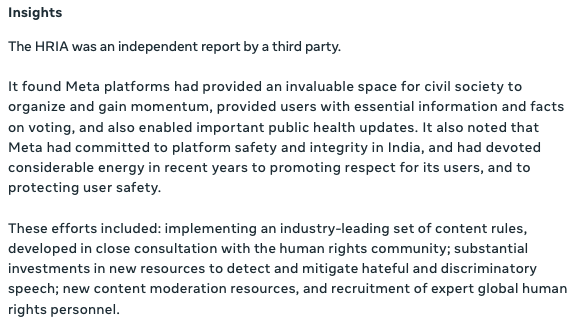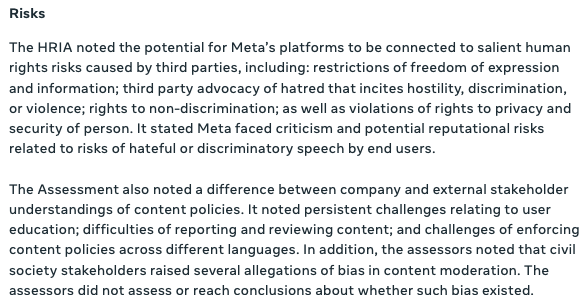tl;dr
Following growing criticism against Meta’s efforts to contain the spread of hate speech and incitement to violence, it released its first annual Human Rights Report, which includes a brief section reporting on the Meta commissioned independent human rights impact assessment (HRIA) for India. In a stark contrast to the reporting on country specific HRIAs released so far, the reporting on India seems perfunctory and non-reflective of the inputs provided by several civil society organisations who participated in the assessment. Furthermore, Meta fails to publish the full report of the HRIA which leads to concerns around transparency and accountability.
Introduction
Meta (formerly Facebook) released its first annual Human Rights Report 2020-2021 since adopting their Human Right Policy in 2021. The report claims to draw inspiration from Principle 15 of the UN Guiding Principles on Business and Human Rights which states that companies must “know and show” that they respect human rights. The report also includes a summary of the independent human rights impact assessment (HRIA), commissioned by Meta in 2019, on potential human rights risks in India related to its platforms. This follows the publication of several reports by civil society groups in 2019, criticising Facebook’s content policy rules and content moderation processes in India. Thus, using the guidance of the United Nations Guiding Principles (UNGPs), Meta initiated a human rights due diligence project in an effort to identify the most salient risks to human rights. The assessment, which was launched in 2020 and ended in mid 2021, was conducted independent of Meta.
India specific insights from the report
As per the methodology, the HRIA involved interviews with 40 civil society stakeholders, academics, and journalists, whose identities were kept anonymous. The HRIA found that,
“Meta platforms had provided an invaluable space for civil society to organize and gain momentum, provide users with essential information and facts on voting, and also enabled important public health updates.”
The insights section of the report (page 59), which gave a rather glowing review, stated that Meta has “committed” to “platform safety and integrity in India” in addition to “protecting respect for its users and to protecting user safety”.

The HRIA expressed that Meta faced criticism and potential reputational risks related to risks of hateful or discriminatory speech by end users. Under the 'Risks' section (page 59), the annual report also noted that Meta’s platforms had the potential to be connected with the following ‘salient human rights risks caused by third parties’:
- restrictions of freedom of expression and information;
- third party advocacy of hatred that incites hostility, discrimination, or violence;
- rights to non-discrimination;
- violations of rights to privacy and security of person.

From 2020 to 2022, Meta has reportedly significantly increased its India-related content moderation workforce as well as language support, and it currently has language reviewers across 21 Indian languages. With respect to transparency on content trends, Meta mentioned its monthly publication of India transparency reports which covers multiple policy areas for Facebook, Instagram, and WhatsApp. They also admitted to actively seeking ways to improve their transparency reporting around government requests to remove or restrict content.
Meta’s reporting for India vs. the Rest of the World
In recent years, Meta has released multiple full reports following commissioned HRIAs on its operations in various countries. So far, Meta has released the full version of the HRIA conducted in Myanmar, which is 62 pages long. It has also released executive summaries of assessments it commissioned on its operations in Indonesia, Sri Lanka, Philippines and Cambodia. The summaries, which were all eight pages long, included detailed and extensive analysis on the human rights impacts as well as recommendations to Meta. The assessment report for Sri Lanka and Philippines even included a section on Meta’s response prior and during the assessment. Inter alia, the summaries mentioned detailed risks to several salient human rights such as, disinformation, misinformation, incitement to violence, online harassment, surveillance, online sexual exploitation, extremist activity, free expression and privacy, non-discrimination, as well as impact of vulnerable groups, children, women, human rights defenders, religious minorties, and LGBTQ+ community. This is in stark contrast to the coverage on the summary disclosure of the HRIA commissioned in India. The section specific to India in the recently released Annual Human Rights Report was barely four pages long, out of which the “apparent” insights and risks were covered in a single page.
Meta has in the past released in-depth reports following HRIA on the potential impact on human rights as a result of expansion of end-to-end encryption. It has also released multiple reports following civil rights audits conducted by independent third-parties, one of which gathered concerns from around 100 civil society organisations.
Concerns around integrity of the HRIA and its reporting by Meta
On January 03, 2022, a joint letter, signed by multiple signatories, was sent to Meta’s Director of Human Rights in relation to the then unreleased Meta related HRIA. The letter referred to a Wall Street Journal (WSJ) article dated November 12, 2021, which raised concerns about Facebook stifling and delaying the independent assessment by raising technical objections, narrowing the report’s scope, and making definitional and scope changes of terms like “hate speech”. The letter also included mention of a concerning revelation made in a WSJ article released in August 2020 that reflected a pattern of favouritism by Facebook India towards the Bharatiya Janata Party (BJP). Given the extent of allegations against Facebook in regards to human rights violations in India, the letter demanded the conduct of HRIA be “thorough, extensive, and entirely independent”.
Another WSJ article released yesterday (July 14, 2022) reveals that “Meta doesn’t plan to release it (the HRIA) in its entirety”.
Meta says it doesn't plan to release the full HRIA.
— Newley Purnell (@newley) July 14, 2022
That decision is "deeply disappointing,” one rights group that provided the law firm with input told me.
It also quoted Ratik Asokan of India Civil Watch International, one of the organisations that provided its inputs during the HRIA, who expressed his deep disappointment with Facebook’s decision to not release the full assessment.
As a volunteer-led organization we engaged with this process putting in +100 hours of free labor to provide evidence & testimony. The report captures NONE of the facts or recommendations submitted by Indian civil society. https://t.co/um3Pw377fE @Article21_Ind @internetfreedom
— India Civil Watch (@indiacivilwatch) July 14, 2022
The November 2021 WSJ article revealed that the inputs provided by another organisation to Foley Hoag, which was the third-party organisation conducting the assessment, remained unimplemented till date. It further revealed that Foley Hoag pushed the organisation to “demonstrate that specific content on its platforms has caused harm”, and even challenged the latter on “what it flagged as hate speech”. This was, in the organisation’s opinion, an unlikely expectation during an human rights impact assessment and was “not in the spirit of assembling an independent report”.
Apar Gupta, Advocate and Executive Director at Internet Freedom Foundation, who also participated in the interview as a civil society participant, expressed his disappointment on the reporting around the assessment commissioned in India.
“India has the largest number of Facebook and WhatsApp users in the world. It is a country that needs to be viewed by Meta as being more than a lucrative market. Questions have arisen and distrust has grown locally due to regular whistleblower reports and scandals. For any honest accounting to commence at the very least the full contents of the human rights impact assessment requires urgent disclosure. This will provide important grounding particularly for experts, legislators, regulators and journalists to independently assess and verify remedial actions. If we have to make social media better and safer for millions of Indians then both its harm and benefit needs to be assessed through public scrutiny. The summary particularly the sentence, "Meta platforms had provided an invaluable space for civil society to organize and gain momentum, provide users with essential information and facts on voting, and also enabled important public health updates.” is not reflective of inputs provided by me during this process."
We reiterate the demand made in the joint letter and in our letter to the company: Meta must release a public, unredacted, and complete India Human Rights Impact Assessment without delay.
Important Documents
- Meta Human RIghts Report - Insights and Action 2020-2021 released in July 2022 (link)
- Representation to Parliamentary Standing Committee on IT regarding the WSJ Story on Facebook India dated August 17, 2020 (link)
- Our blogpost highlighting Facebook’s discriminatory standards for human rights enforcement in the United States and India (link)
- Letter to Standing Committee on IT on Facebook Whistleblower revelation dated October 25, 2021 (link)


